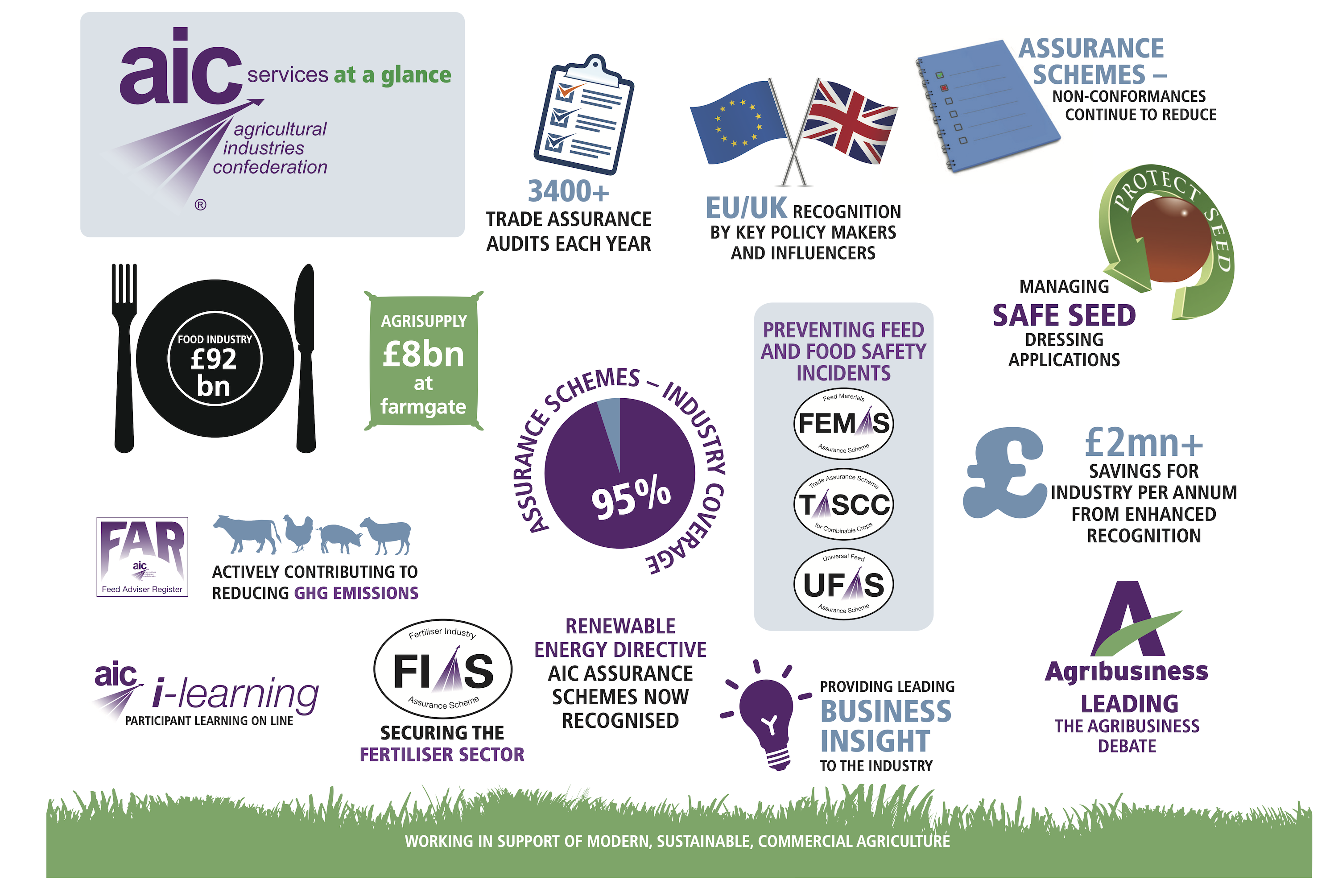AIC have developed a range of Trade Assurance Schemes covering areas of the Agri-supply industry in which our members are engaged. They fall into four categories: Food/Feed Safety, Fertiliser Security and Traceability, Safe Application of Seed Treatments and Renewable Energy (RED).
The infographic below has been produced to provide information about some of the key projects and background data of AIC Services.
Our Aims
AIC manage a number of trade assurance schemes on behalf of the agri supply industry. These have been developed in consultation with members and other stakeholders and have the following aims:
- To minimise the risk of adverse incidents or publicity in our industry
- To provide due diligence and assist businesses in meeting legislative requirements
- To meet customer requirements in the UK and Internationally
- To add value to participating companies
- To ensure that uniform standards are applied across the industry
- To keep red tape and costs to a minimum
Our Objectives
AIC deliver these aims through the following objectives:
- Proactive management of scheme documents with input from industry committees
- Management of certification and audit bodies
- Dialogue with appropriate Government and Stakeholders
- Communication with scheme participants
- Offering technical support
Benefits
Providing safe feed and food is essential to ensure that the risk of a food or feed ‘incident’ is minimised. A complex web of supply chains combine to achieve this and the Agricultural Industries Confederation’s (AIC) food & feed trade assurance schemes form a vital part of the ’assured chain’ which minimises risk.
AIC has also developed schemes to ensure the safety and security of the GB fertiliser supply chain, and the safe and responsible use of seed dressings.
The AIC assurance schemes are designed for:
- Feed compounders and merchants
- Feed ingredient producers and suppliers
- Fertiliser manufacturers and merchants
- Grain merchants and stores
- Seed processors
- Grain, feed and fertiliser hauliers
Food/Feed Safety
UFAS (Universal Feed Assurance Scheme) deals with the production and delivery of compounds feeds and the supply of feeds to the farm.
FEMAS (Feed Materials Assurance Scheme) covers the sourcing and production of feed ingredients, either by certifying complete supply chains or by the “gatekeeper” Intermediate Supplier Standard.
TASCC (Trade Assurance Scheme for Combinable Crops) deals with what happens to grains and pulses when they leave the farm to the end user.
Monitoring Feed and Feed Ingredients
As part of the AIC Services Schemes' commitment to feed & food safety, a sampling and monitoring programme is in place for compound feed.
Samples are collected from all UFAS Participants and monitored for dioxins and mycotoxins. Results are compared against legal limits; results are reported and appropriate action taken as required.
Other industry partners also carry out a range of sampling and monitoring programmes of raw materials, details of these programmes are found in the following information.
Fertiliser Security and Traceability
FIAS (Fertiliser Industry Assurance Scheme) has been developed to help the industry manage the safety, security and traceability of all fertilisers.
Safe application of plant protection products to seeds
ESTA (European Seed Treatment Assurance scheme) is for the seed treatment industry to preserve essential plant protection products, protect international trade and ensure ongoing investment within the sector.
For guidance for using the ESTA logo please see the ESTA Standard.
All the schemes are operated by independent certification bodies under current accreditation from UKAS (United Kingdom Assurance Service). The schemes are managed in consultation with a variety of stakeholders including scheme participants and government along with customer and supplier groups.
History
Food Feed Schemes
People want to know where their food comes from and they want reassurance it is safe to eat. Animal feed and grains, oilseeds and pulses are clearly important for the food chain - and AIC has created a set of assurance schemes to cover them. The schemes apply to:
- the sources of feed ingredients
- the producers and distributors of animal feed
- the storage, haulage and laboratory analysis of grains, oilseeds and pulses for food, feed and biofuels (called combinable crops because they are harvested by combine harvesters).
The first AIC Trade Assurance Schemes were developed in the mid-nineties in response to consumer and legislative pressure resulting from food scares such as BSE and Salmonella. The later FMD outbreak reinforced the need for safe feed.
Subsequent developments
More recently areas other than food and feed safety have been identified as being able to benefit from independent assurance:
Fertiliser Security, Safety and Traceability
FIAS (Fertiliser Industry Assurance Scheme) has been developed to help the industry manage the safety, security and traceability of all fertilisers.
Safe application of plant protection products to seeds
ESTA (European Seed Treatment Assurance scheme, is for the seed treatment industry to preserve essential plant protection products, protect international trade and ensure ongoing investment within the sector. This is in response to environmental concerns raised over the poor application of plant protection products elsewhere in the EU.


